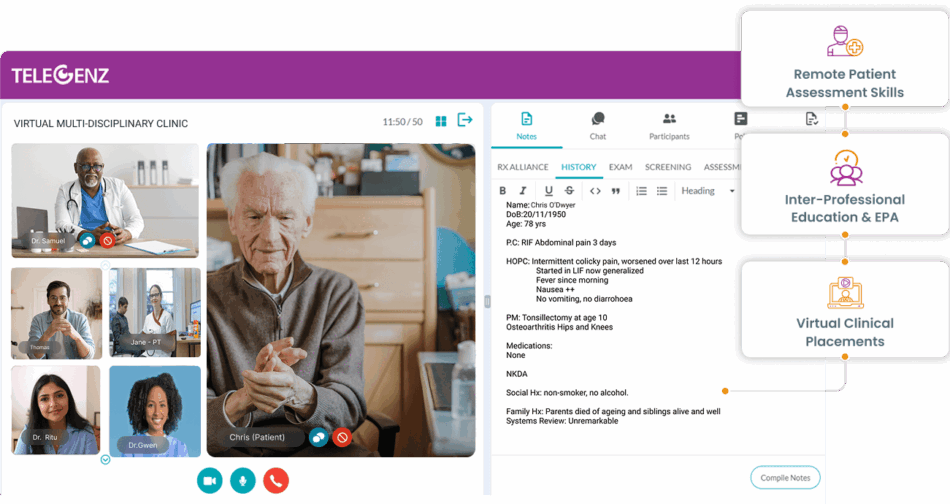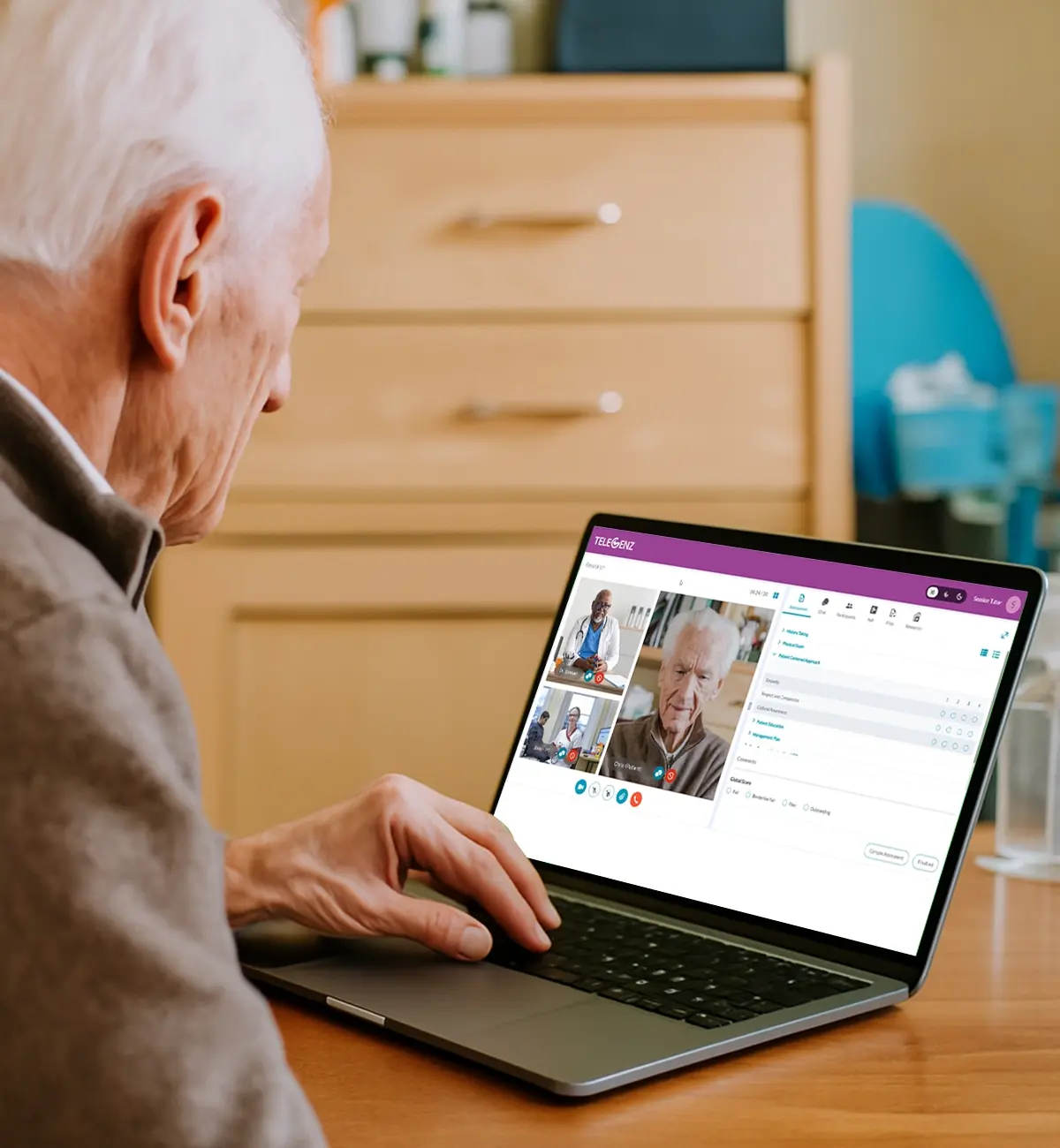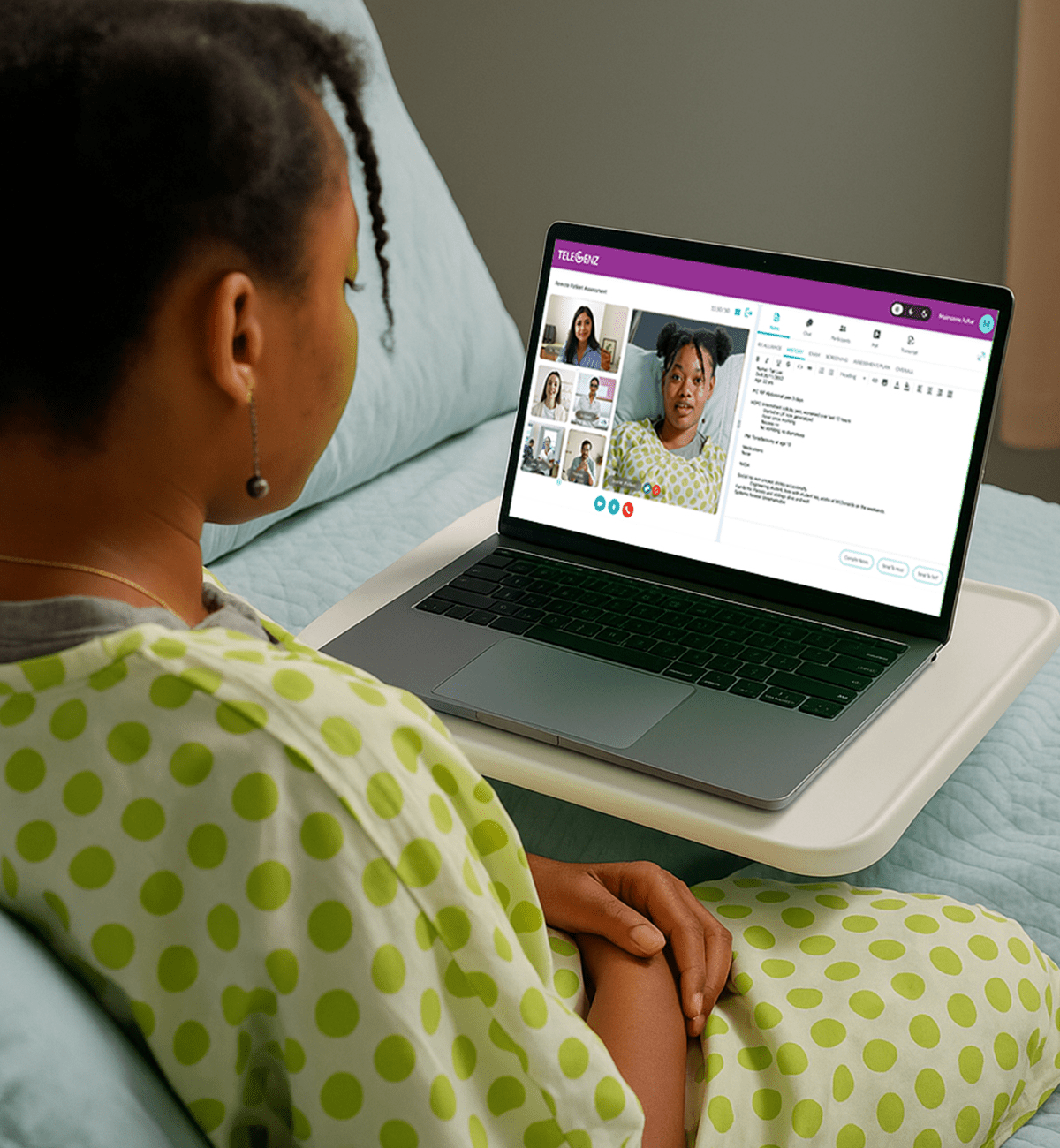Versatile Training
Telegenz: A Versatile Training Platform for Structured Training and Objective Assessment
Telegenz stands at the forefront of digital solutions for clinician training, offering a robust platform that supports both structured skill development and objective assessment in remote clinical environments. With distinct modes tailored for different phases of learning, Telegenz empowers educators and trainees alike to achieve excellence in telehealth competencies. This article examines the platform’s two primary modes—Tutorial Mode and Assessment Mode—highlighting their unique contributions to clinician training and skill acquisition
Tutorial Mode
Overview and Purpose
Tutorial Mode in Telegenz is designed to facilitate immersive, hands-on learning experiences, closely resembling real-world clinical scenarios. It serves as a dynamic environment where trainees can practice remote patient assessment, communication, and technical skills under the guidance of master trainers or educators.

Structured Training with Immediate Feedback
A hallmark of Tutorial Mode is its emphasis on structured, qualitative feedback. Trainers provide detailed, immediate input during or immediately after sessions, enabling trainees to reflect on their performance in real time. This feedback is not only timely but also targeted, addressing specific strengths and areas for improvement. The immediacy helps reinforce positive behaviors and correct mistakes before they become habitual, which is critical for effective learning in clinical settings1.
Standardization and Consistency
Telegenz ensures that feedback within Tutorial Mode is consistent and objective by employing predefined criteria and rubrics. This standardization is vital for fair assessment and reliable skill development, particularly as telehealth introduces new competencies such as “webside manner” (remote communication skills) and remote physical assessment techniques. By aligning feedback with these competencies, Telegenz helps trainees understand exactly where they excel and where further practice is needed1.
Promoting Self-Assessment and Reflection
Tutorial Mode encourages a culture of continuous learning by integrating self-assessment tools and reflective conversations between instructors and trainees. Engaging in self-assessment and receiving structured feedback fosters a state of “reflection in action,” which is essential for professional growth and clinical competence. This approach not only accelerates skill acquisition but also instills a mindset of lifelong learning among clinicians1.
Customization and Flexibility
The platform’s flexible design allows training programs to tailor feedback and scenarios to specific clinical needs, research protocols, or accreditation requirements. This adaptability ensures that training remains relevant across diverse disciplines and settings, supporting the unique needs of each trainee and organization1.
Efficient Use of Instructor Time
Telegenz’s remote capabilities eliminate the need for travel, enabling instructors to provide more frequent and meaningful interactions with trainees. This efficiency maximizes the impact of training sessions, allowing for continuous engagement and support throughout the learning journey1.
Assessment Mode
Overview and Purpose
Assessment Mode in Telegenz is engineered to deliver objective, data-driven evaluations of trainee performance. Unlike Tutorial Mode, which focuses on formative feedback and skill development, Assessment Mode emphasizes summative evaluation, measuring competency against established benchmarks


Objective Feedback and Standardized Evaluation
The core strength of Assessment Mode lies in its ability to provide objective feedback based on clear, predefined criteria. This ensures that all trainees are evaluated consistently and fairly, which is essential for reliable assessment, research data collection, and audit processes. The platform’s rubrics and scoring systems offer actionable insights, highlighting specific areas where trainees meet or fall short of expectations1.
Real-Time and Asynchronous Feedback
Assessment Mode supports both real-time and asynchronous feedback. During live sessions, trainees receive immediate input, while recorded interactions allow for detailed, post-session review. This flexibility is especially valuable in remote clinical assessments, where immediate debriefing may not always be feasible. By accommodating both feedback styles, Telegenz ensures that assessments are comprehensive and timely1.
Enhanced Learning and Research Outcomes
Research demonstrates that ongoing, structured feedback is crucial for effective clinical skills development. Telegenz’s Assessment Mode enables detailed, multi-source feedback—combining peer, faculty, and self-assessments—which leads to significant improvements in self-rated clinical competencies. This multi-faceted approach accelerates skill acquisition and supports continuous quality improvement1.
Support for Audit and Quality Assurance
Assessment Mode facilitates robust documentation of performance trends and feedback records. This documentation is invaluable for audit processes, quality assurance, and identifying areas needing intervention. By maintaining evidence-based, traceable feedback, Telegenz helps organizations uphold high standards in remote clinical assessments1.
Customization for Diverse Use Cases
Just as in Tutorial Mode, Assessment Mode allows organizations to customize feedback templates and scenarios to meet specific clinical, research, or accreditation needs. This adaptability ensures that assessments remain relevant and effective across different disciplines and settings, supporting a wide range of training and research objectives1.
Comparative Summary: Tutorial Mode vs. Assessment Mode
| Feature | Tutorial Mode | Assessment Mode |
|---|---|---|
| Purpose | Skill development, formative feedback | Summative evaluation, objective assessment |
| Feedback Type | Qualitative, immediate, structured | Objective, data-driven, standardized |
| Instructor Role | Guide, mentor, provide detailed feedback | Assessor, provide objective evaluation |
| Self-Assessment | Encouraged, integrated into sessions | Supported, but focused on external benchmarks |
| Flexibility | Highly customizable for scenarios and feedback | Customizable for rubrics and scenarios |
| Use Case | Training, practice, continuous improvement | Certification, research, audit, quality control |
Conclusion
Telegenz emerges as a versatile and comprehensive platform for clinician training and assessment in telehealth environments. Its dual-mode approach—combining Tutorial Mode’s structured, qualitative feedback with Assessment Mode’s objective, data-driven evaluation—addresses the full spectrum of learning needs. By promoting standardization, customization, and continuous improvement, Telegenz equips clinicians with the skills and confidence required for high-quality remote patient care. The platform’s emphasis on actionable insights, efficient use of instructor time, and support for audit and research makes it an indispensable tool for modern healthcare education and quality assurance.






